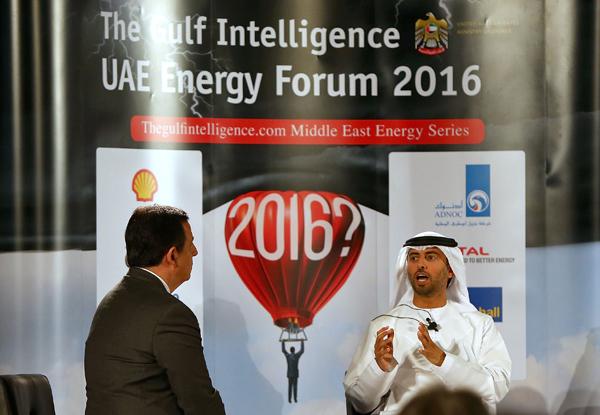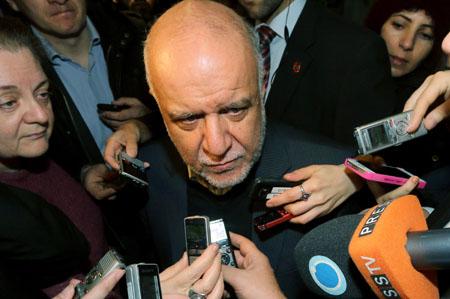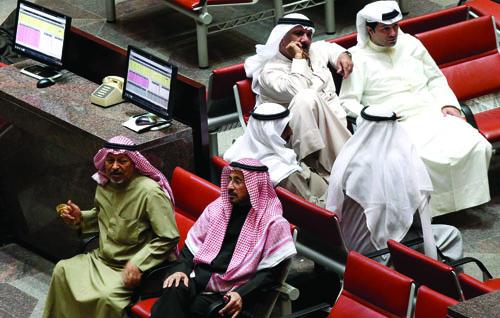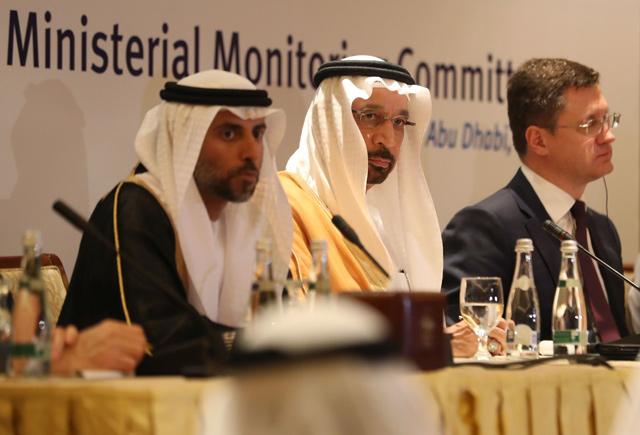You are here
Fresh oil lows spark call for OPEC emergency meeting
By AFP - Jan 13,2016 - Last updated at Jan 13,2016

United Arab Emirates Energy Minister Suhail Bin Mohamed Al Mazroui (right) speaks during the 7th Gulf Intelligence UAE Energy Forum meeting in Abu Dhabi, on Tuesday (AFP photo)
LONDON — Oil forged fresh 12-year lows Tuesday on global oversupply, prompting Nigeria, a member of the Organisation of Petroleum Exporting Countries (OPEC) to call for an emergency meet to address collapsing prices that has ravaged revenues.
In early morning deals, New York's benchmark West Texas Intermediate (WTI) for February delivery tanked to $30.41 a barrel, which was the lowest level since December 3, 2003.
Europe's Brent North Sea crude for February dived to $30.43, a point last seen on April 6, 2004.
Nigerian Petroleum Resources Minister Emmanuel Ibe Kachikwu declared that he expects an extraordinary meeting of the oil group in "early March" to discuss nosediving crude prices.
"We did say that if it [the price] hits the $35 per barrel, we will begin to look [at]... an extraordinary meeting," said Kachikwu, whose term as OPEC president finished in December.
The prices have hit levels that necessitate a meeting, he told an energy forum in Abu Dhabi, but added that he had not yet confirmed with fellow OPEC ministers if they would be willing to attend.
Stopping the slide?
"The prospect of a meeting is definitely capping losses for the day and driving prices back towards $32, however I cannot see it stopping the slide in the longer term," said analyst James Hughes at trading firm GKFX.
"The call for the meeting is not necessarily a surprise as we have lost almost 20 per cent since the start of the year and are looking to test $20 a barrel," he added.
In midday deals on Tuesday, Brent prices rebounded by 25 cents to $31.82, while WTI clawed back ground to stand at $31.30, down 11 cents from Monday's close.
Saudi-led Gulf exporters within OPEC have so far refused to cut production to curb sliding prices, seeking to protect their market share despite a heavy blow to their revenues.
Kachikwu said member states differ on the issue of intervention.
"One group feels there is a need to intervene. The other group feels even if we did, we are only 30 to 35 per cent of the producers really," as 65 per cent of supply comes from non-OPEC countries, he said at the Gulf Intelligence UAE Energy Forum.
Nigeria, Africa's largest economy and foremost oil producer, has been ravaged by collapsing oil prices in recent years because crude accounts for 90 per cent of the nation's export earnings and 70 per cent of overall government revenue.
"The reported breakeven price for Nigeria is around $87 a barrel and with the price looking so much weaker it’s no surprise if they are one of the countries asking for a meeting before the next scheduled one in June," said Hughes, noting rumours that other OPEC members also wanted an exceptional gathering.
OPEC refused to slash output at its scheduled production meetings in June and December last year, despite a collapse in prices since July 2014, when the market stood above $100 per barrel.
OPEC's 'big gamble'
The Saudi-backed policy, and supported really by only OPEC's Gulf members, is aimed at pushing oil prices lower to squeeze US shale producers out of the market. However, it has slammed smaller producing nations like Nigeria and Venezuela.
"OPEC has taken a big gamble that hasn't really worked so far," said analyst Fawad Razaqzada at Gain Capital.
"Essentially, the smaller OPEC members, who are struggling really badly, are unlikely to be able to persuade the Saudis to make a U-turn on its policy of maintaining market share," he added.
The market's dramatic collapse has continued in 2016, as a row between OPEC kingpin Saudi Arabia and fellow group member Iran dimmed prospects for production cutbacks.
Crude futures plummeted 10 per cent last week, also on fears about the global supply glut and demand weakness in China, the world's biggest energy user.
The rise in the greenback, which makes dollar-priced oil more expensive for holders of weaker currencies, has dented prices as well.
United Arab Emirates (UAE) Energy Minister Suhail Al Mazroui expects a recovery in plummeting oil prices before the end of the year.
"I am personally convinced that before the end of 2016 we're going to see a correction. The market fundamentals tell us this," Mazroui told the energy forum in Abu Dhabi.
The minister said demand for oil had been higher than expected last year.
"The increase in demand, if you look at 2015, was higher than we expected. We said 1.2 [million barrels per day] to 1.25 million, and we ended up with 1.5 [million]," he said.
"That means when oil prices are lower, demand will be higher," he added. "The market will resolve it. I think that's the only fair assessment of the current situation."
According to Mazroui, the decision by Gulf producers to maintain production levels was working to cull excess output.
"I think the strategy is working," he said. "It is a fundamental change... allowing the market to balance itself. If we do something artificial, I don't think that is going to last," in an apparent reference to calls by other OPEC producers to cut output in a bid to support the nosediving prices.
The UAE, a federation of seven sheikhdoms, sits on 5.9 per cent of the world's oil reserves and 3.1 per cent of its natural gas.
The oil price slump has seen it and other Gulf states embark on belt-tightening measures to cut spending and boost non-crude revenues.
The UAE took the lead by liberalising fuel prices in June and raised electricity charges in Abu Dhabi.
Related Articles
Organisation of Petroleum Exporting Countries (OPEC) Gulf oil producers will not propose an output cut on Thursday, reducing the likelihood of joint action by OPEC to prop up prices that have sunk by a third since June and raising the prospect of a global oil price war.
Members of the Organisation of Petroleum Exporting Countries (OPEC) which backed an output cut at the group's meeting last month are coming around to the view of Saudi Arabia that they need to focus on market share, further reducing the chance of any action to defend prices.
ABU DHABI — Saudi Arabia, the world's top crude exporter, said on Sunday it will cut oil output from next month, as major producers held a k















